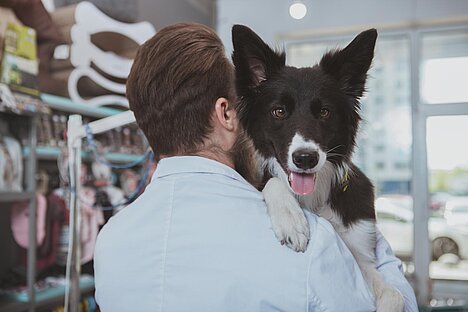Hyperthyroidism

Hyperthyroidism is a condition in which the thyroid gland produces too much thyroid hormone. This can lead to various symptoms such as weight loss, increased appetite, nervousness, restlessness, diarrhea, vomiting, rapid heartbeat and shortness of breath. Hyperthyroidism is very rare in dogs, but can have serious consequences if it is not treated.
Causes of hyperthyroidism in dogs
The most common cause of hyperthyroidism in dogs is the administration of too much thyroid hormone as medication. This can happen if your dog has hypothyroidism, which is an underactive thyroid gland, and is on hormone replacement therapy. If the dose is too high or your dog does not tolerate the medication properly, hyperthyroidism can occur.
Another possible cause of hyperthyroidism in dogs is a thyroid tumor. These can be benign or malignant and increase the production of thyroid hormone. However, thyroid tumors are very rare in dogs and usually occur in older animals.
Diagnosis of hyperthyroidism in dogs
If you suspect that your dog is suffering from hyperthyroidism, you should take him to the vet as soon as possible. The vet will perform a physical examination and take a blood sample to measure the level of the thyroid hormone T4. An elevated T4 level indicates hyperthyroidism.
However, sometimes the T4 level may be normal or only slightly elevated even though your dog has hyperthyroidism. This can happen, for example, if your dog has other conditions that can affect T4 levels or if he is taking certain medications. In this case, the vet may perform further tests, such as a TSH stimulation test or a T3 suppression test, to confirm the diagnosis.
To determine the cause of hyperthyroidism, the vet may also perform an ultrasound scan or scintigraphy of the thyroid gland. This involves injecting a radioactive substance into the vein and measuring the uptake by the thyroid gland. An enlarged or uneven thyroid gland may indicate a tumor.
Treatment of hyperthyroidism in dogs
The treatment of hyperthyroidism in dogs depends on the cause. If the hyperthyroidism is caused by an overdose of thyroid hormone, the dose will need to be adjusted or the medication stopped. The vet will regularly check the T4 level to find the correct dose.
If the hyperthyroidism is caused by a thyroid tumor, there are several treatment options. One option is surgical removal of the tumor. However, this can be associated with risks, such as injury to the vocal cords or parathyroid glands. Another option is radioiodine therapy. This involves administering a radioactive substance that accumulates in the thyroid gland and destroys the tumor. This method is very effective and has few side effects, but is also expensive and requires a special facility. A third option is drug treatment with thyreostatics. These inhibit the production of thyroid hormone and can alleviate the symptoms. However, they must be taken for life and can have side effects such as liver damage or blood count changes.
Prognosis of hyperthyroidism in dogs
The prognosis of hyperthyroidism in dogs depends on the cause and treatment. If the hyperthyroidism is caused by an overdose of thyroid hormone, it can usually be well controlled by adjusting the dose. If the hyperthyroidism is caused by a thyroid tumor, it may be curable or only palliative, depending on the type and size of the tumor and the treatment method chosen. In any case, it is important to have your dog examined regularly by a vet and to monitor his symptoms.
Tips for dealing with hyperthyroidism in dogs
If your dog has hyperthyroidism, there are some things you can do to make their life easier. Here are some tips:
- Feed your dog high-quality food that meets his energy needs. However, avoid too much fat and protein, which can further stimulate the thyroid gland.
- Provide plenty of fresh water to compensate for fluid loss due to vomiting or diarrhea.
- Keep your dog away from stress, which can exacerbate his symptoms. Provide a calm and relaxed environment and avoid sudden changes in his routine.
- Give your dog the prescribed medication exactly as directed by the vet. Pay attention to possible side effects and report them to the vet.
- Be patient and loving with your dog. He can't help his condition and needs your support and affection.
The authors assume that a veterinarian should be consulted if an animal is ill and that medication should only be taken after consultation with a doctor or pharmacist. Only an individual examination can lead to a diagnosis and treatment decision.
We help you find the nearest vet → This way